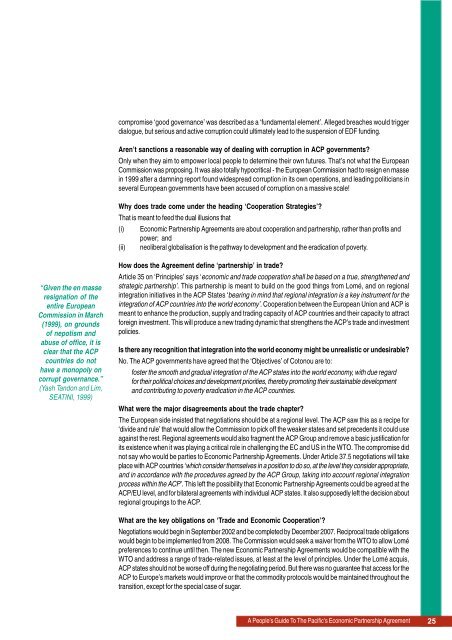REPA Booklet - Stop Epa
REPA Booklet - Stop Epa
REPA Booklet - Stop Epa
You also want an ePaper? Increase the reach of your titles
YUMPU automatically turns print PDFs into web optimized ePapers that Google loves.
compromise ‘good governance’ was described as a ‘fundamental element’. Alleged breaches would trigger<br />
dialogue, but serious and active corruption could ultimately lead to the suspension of EDF funding.<br />
Aren’t sanctions a reasonable way of dealing with corruption in ACP governments?<br />
Only when they aim to empower local people to determine their own futures. That’s not what the European<br />
Commission was proposing. It was also totally hypocritical - the European Commission had to resign en masse<br />
in 1999 after a damning report found widespread corruption in its own operations, and leading politicians in<br />
several European governments have been accused of corruption on a massive scale!<br />
Why does trade come under the heading ‘Cooperation Strategies’?<br />
That is meant to feed the dual illusions that<br />
(i) Economic Partnership Agreements are about cooperation and partnership, rather than profits and<br />
power; and<br />
(ii) neoliberal globalisation is the pathway to development and the eradication of poverty.<br />
“Given the en masse<br />
resignation of the<br />
entire European<br />
Commission in March<br />
(1999), on grounds<br />
of nepotism and<br />
abuse of office, it is<br />
clear that the ACP<br />
countries do not<br />
have a monopoly on<br />
corrupt governance.”<br />
(Yash Tandon and Lim,<br />
SEATINI, 1999)<br />
How does the Agreement define ‘partnership’ in trade?<br />
Article 35 on ‘Principles’ says ‘economic and trade cooperation shall be based on a true, strengthened and<br />
strategic partnership’. This partnership is meant to build on the good things from Lomé, and on regional<br />
integration initiatives in the ACP States ‘bearing in mind that regional integration is a key instrument for the<br />
integration of ACP countries into the world economy’. Cooperation between the European Union and ACP is<br />
meant to enhance the production, supply and trading capacity of ACP countries and their capacity to attract<br />
foreign investment. This will produce a new trading dynamic that strengthens the ACP’s trade and investment<br />
policies.<br />
Is there any recognition that integration into the world economy might be unrealistic or undesirable?<br />
No. The ACP governments have agreed that the ‘Objectives’ of Cotonou are to:<br />
foster the smooth and gradual integration of the ACP states into the world economy, with due regard<br />
for their political choices and development priorities, thereby promoting their sustainable development<br />
and contributing to poverty eradication in the ACP countries.<br />
What were the major disagreements about the trade chapter?<br />
The European side insisted that negotiations should be at a regional level. The ACP saw this as a recipe for<br />
‘divide and rule’ that would allow the Commission to pick off the weaker states and set precedents it could use<br />
against the rest. Regional agreements would also fragment the ACP Group and remove a basic justification for<br />
its existence when it was playing a critical role in challenging the EC and US in the WTO. The compromise did<br />
not say who would be parties to Economic Partnership Agreements. Under Article 37.5 negotiations will take<br />
place with ACP countries ‘which consider themselves in a position to do so, at the level they consider appropriate,<br />
and in accordance with the procedures agreed by the ACP Group, taking into account regional integration<br />
process within the ACP’. This left the possibility that Economic Partnership Agreements could be agreed at the<br />
ACP/EU level, and for bilateral agreements with individual ACP states. It also supposedly left the decision about<br />
regional groupings to the ACP.<br />
What are the key obligations on ‘Trade and Economic Cooperation’?<br />
Negotiations would begin in September 2002 and be completed by December 2007. Reciprocal trade obligations<br />
would begin to be implemented from 2008. The Commission would seek a waiver from the WTO to allow Lomé<br />
preferences to continue until then. The new Economic Partnership Agreements would be compatible with the<br />
WTO and address a range of trade-related issues, at least at the level of principles. Under the Lomé acquis,<br />
ACP states should not be worse off during the negotiating period. But there was no guarantee that access for the<br />
ACP to Europe’s markets would improve or that the commodity protocols would be maintained throughout the<br />
transition, except for the special case of sugar.<br />
A People’s Guide To The Pacific’s Economic Partnership Agreement 25
















